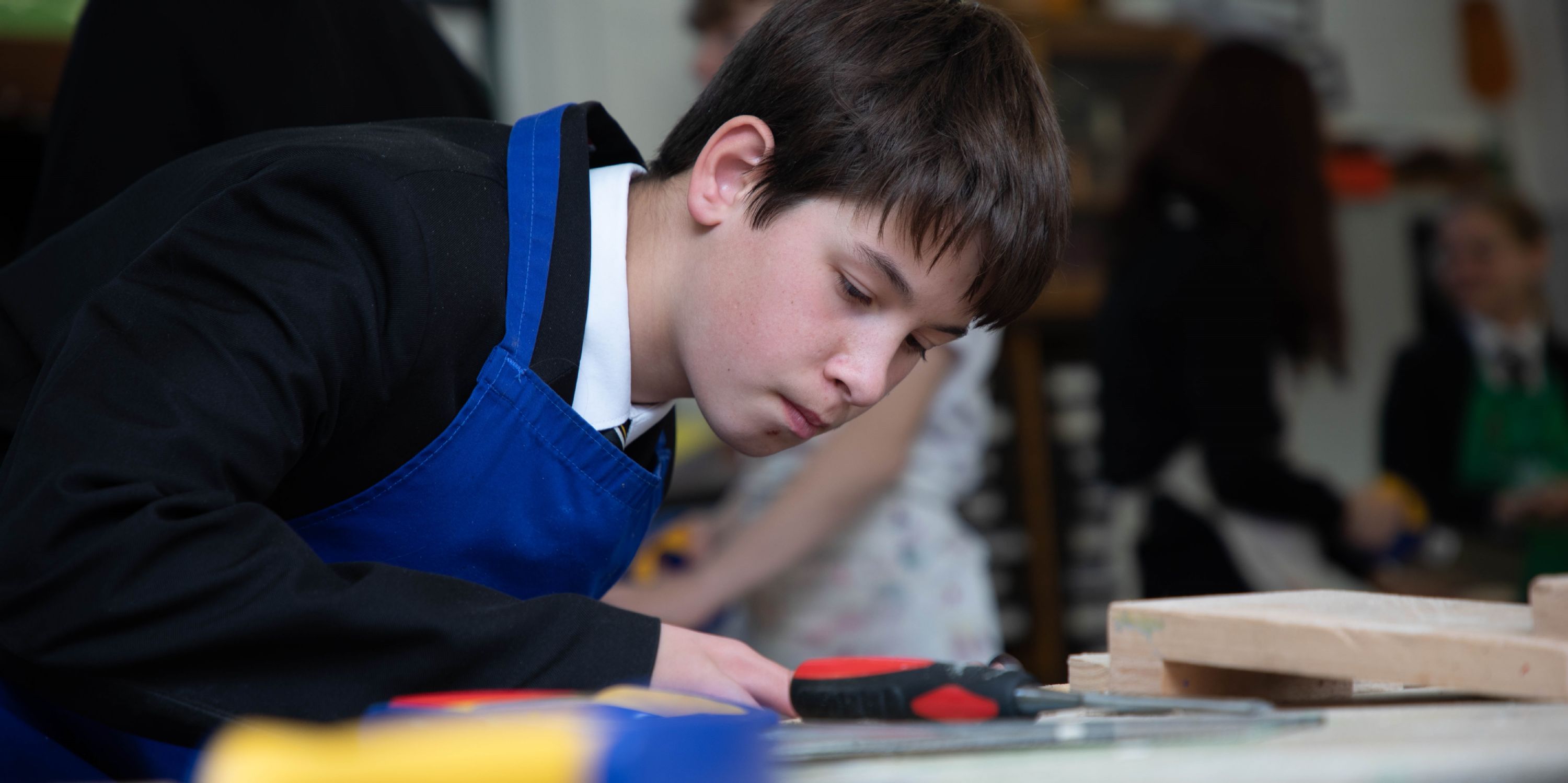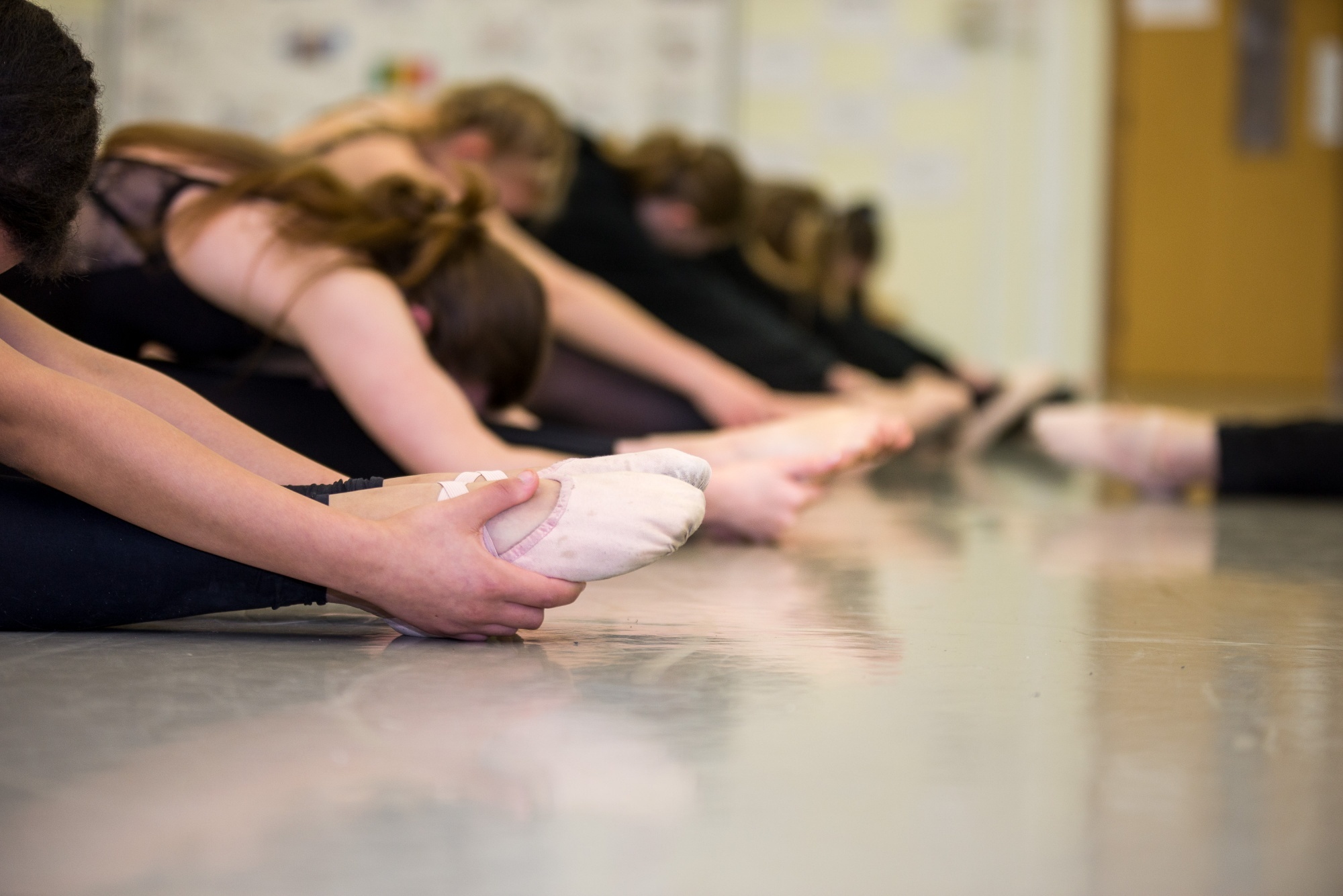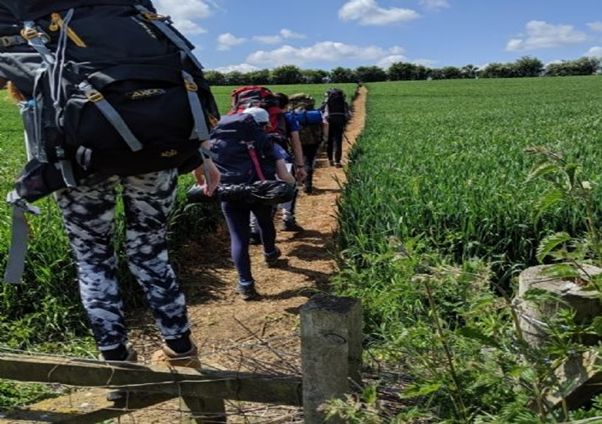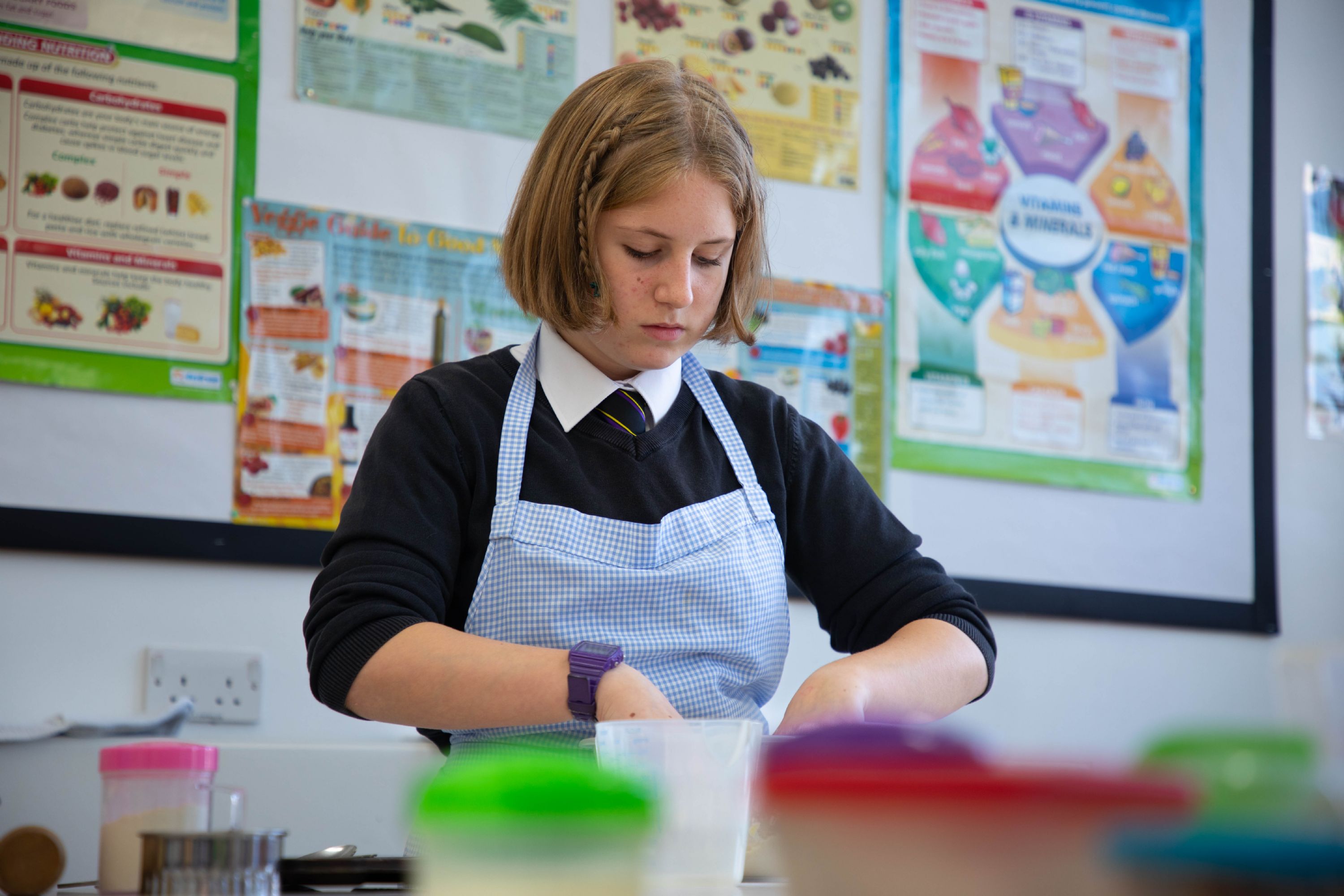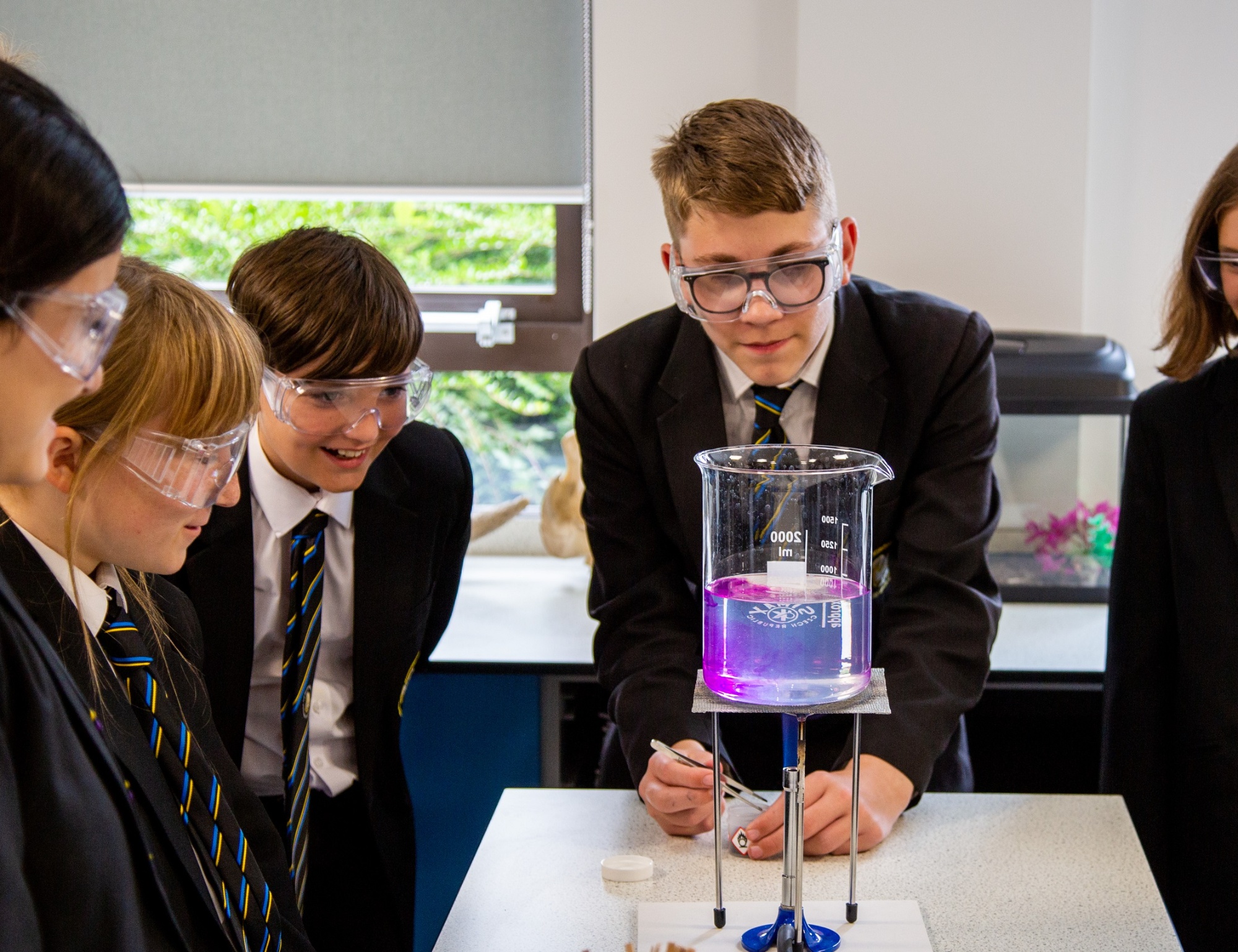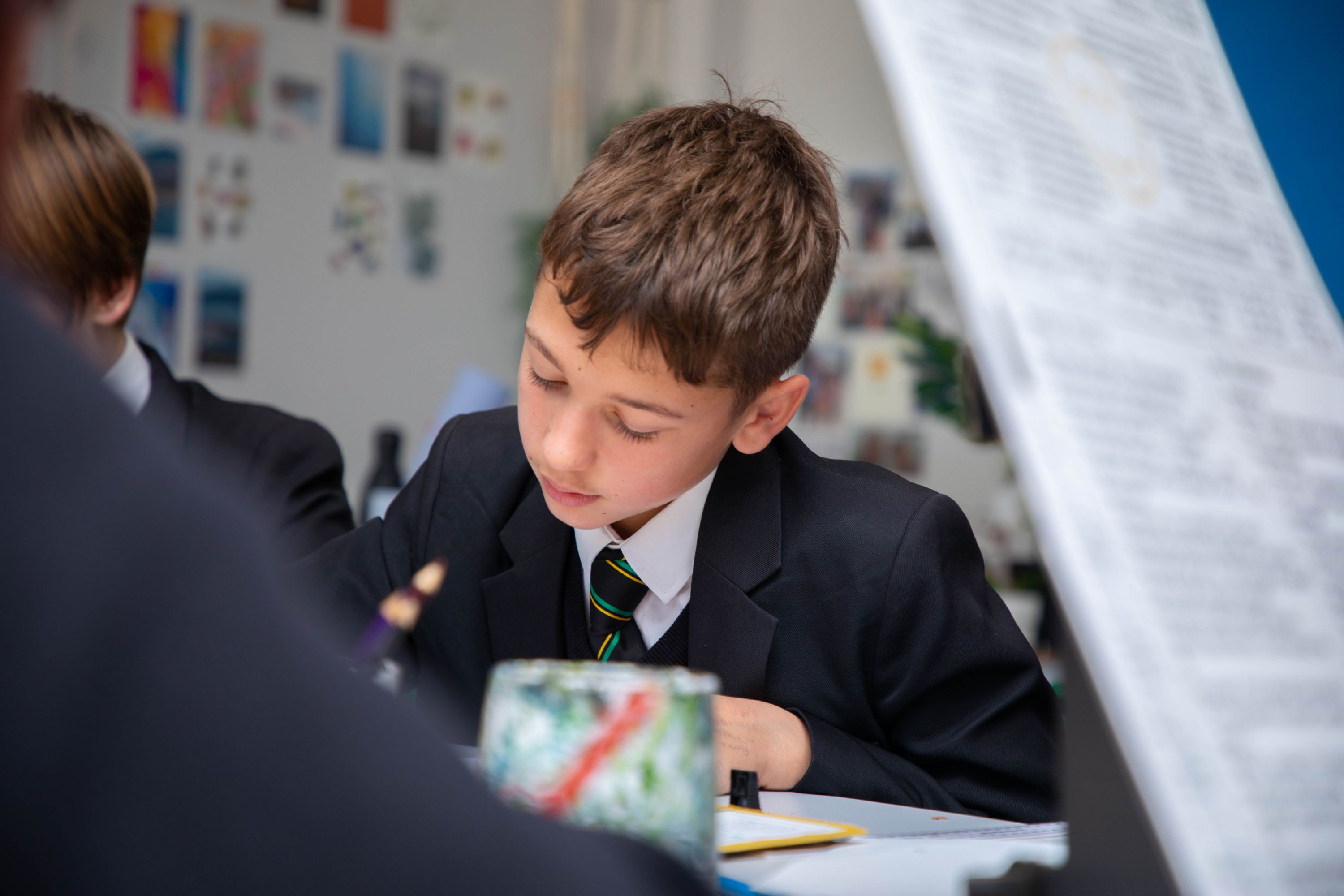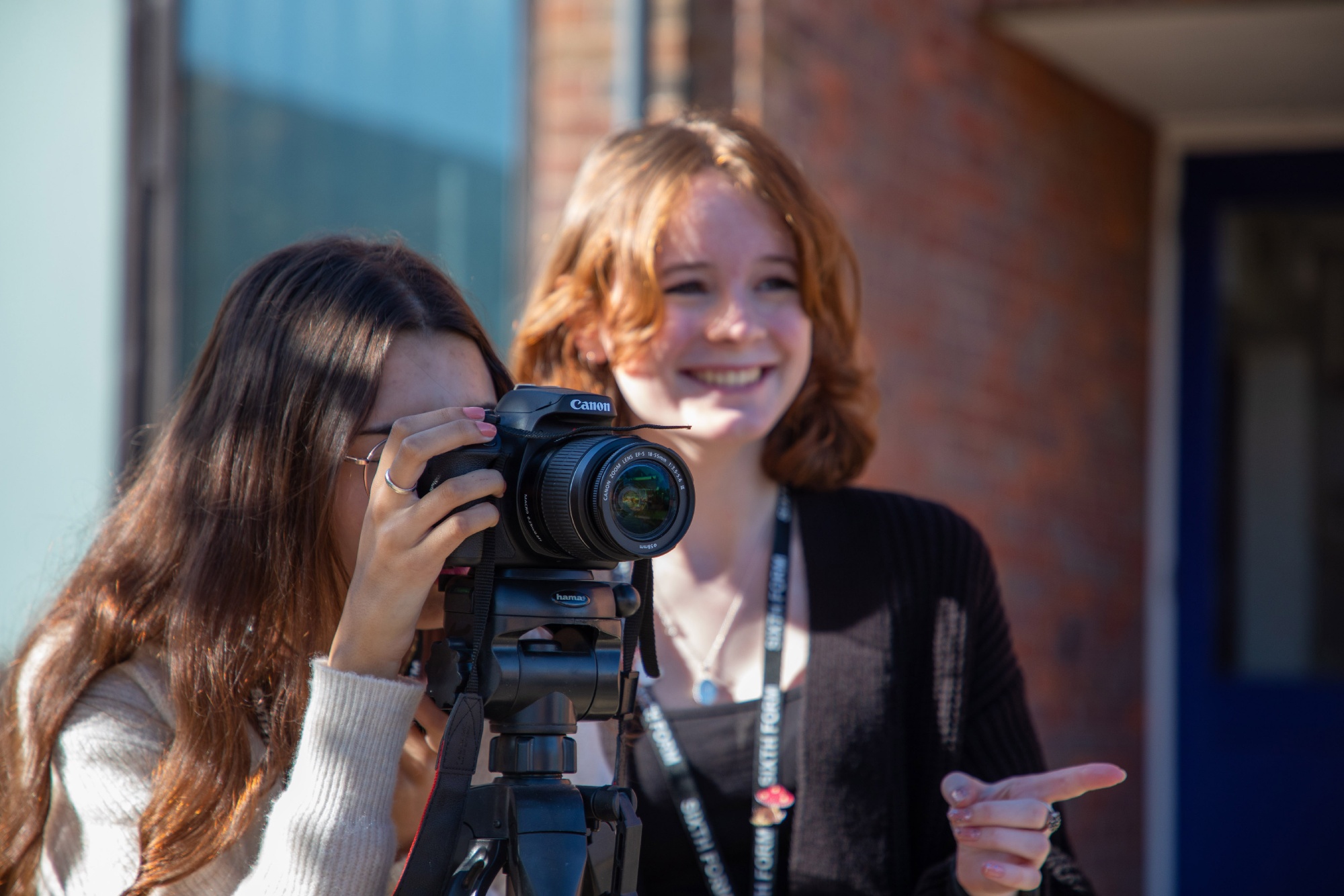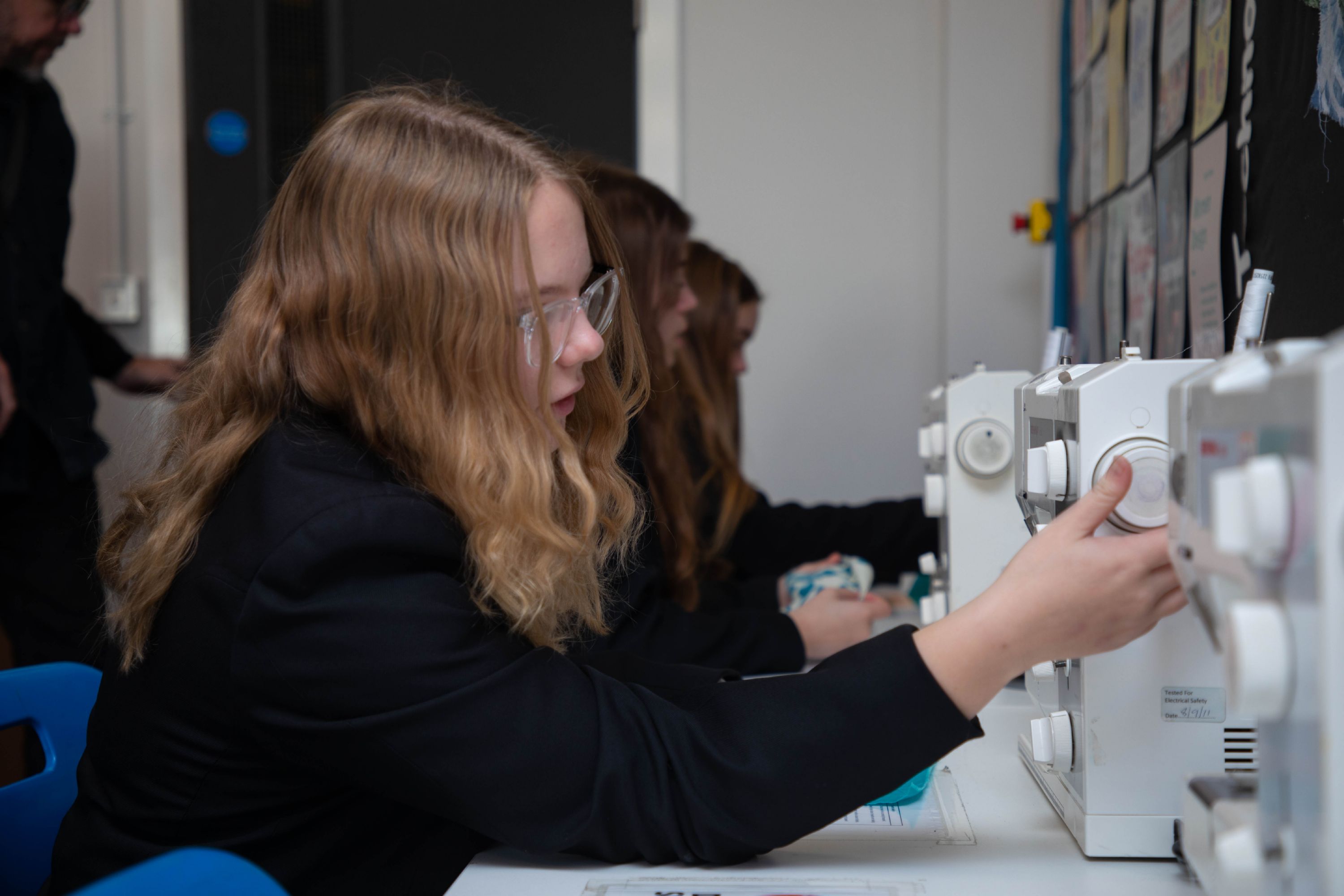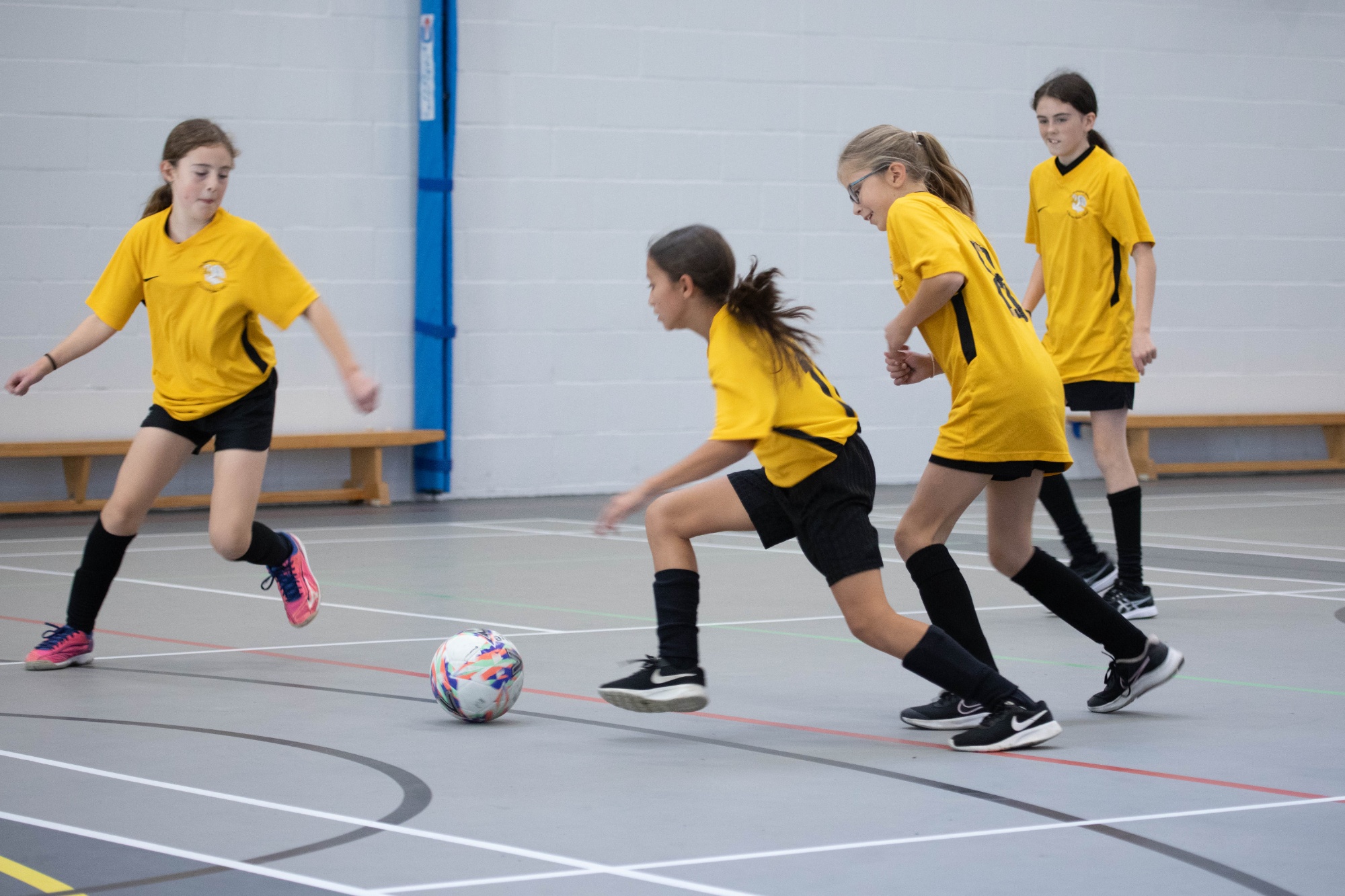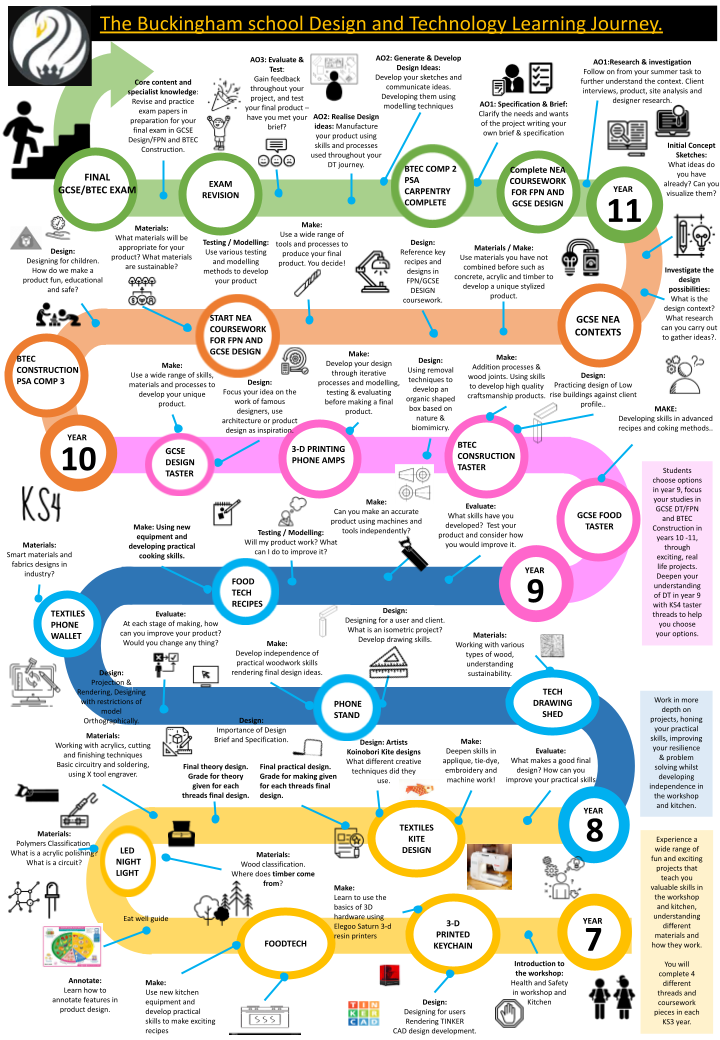Design & Technology (Inc. ASDAN)
Design and Technology Curriculum Intent
The Design and Technology Curriculum at Key Stage 3 and 4 is driven by our engaging, inclusive, ambitious, and values-led ethos, delivering Success for all by nurturing academic progress, personal growth, and social awareness.
In Design Technology, we encourage our students to explore the fundamentals of various Threads in Design Technology using new Technologies. Students will learn the fundamentals of product design and implementation of ideas, with a focused interleaving system of recall in theory and practical skills.
Design & Technology department Ethos
Key Stage 3 – Engaged: Learning with Kindness and Curiosity
In Key Stage 3, the Design and Technology curriculum is designed to ignite curiosity, foster a deep enjoyment of research, design, and make products using new Technologies. Students are encouraged to explore the design processes, developing new skills when using tools and equipment, understanding, and respecting the impact of sustainable manufacturing processes.
Students will learn the fundamentals in design method and implementation of ideas, with a focused interleaving system of recall in theory and practical skills. This will be a cornerstone of our teaching, as we will encourage all Key stage 3 students to research and discover exciting and new developments and practices within each of the threads.
Through engaging and imaginative lessons underpinned by iterative design, students learn to express themselves freely and are openly encouraged to make mistakes and improve on designs, offering productive collaborative feedback amongst their peers. Design and Technology at KS3 emphasises kindness, mutual respect, and collaboration, with students regularly reflecting on their learning, progress, and personal impact within the group.
Students will be taught to be respectful of each other and of their practical environment. They will learn about the safety rules and regulations associated with a Working Kitchen and Workshop. Reflection and recall of skills are embedded across the various threads in the curriculum encouraging the students to go back over previous methods to enable deeper understanding of the subject. This is underpinned with coursework tasks in each thread, which will help students develop resilience, ambition and confidence throughout their Design and Technology journey at The Buckingham School.
Key Stage 4 – Being Independent in GCSE Design and Technology: Taking Responsibility for Learning and Growth
In Key Stage 4 GCSE Design and Technology, students begin to shape their academic pathways and future ambitions. Through a rich and challenging curriculum, they are supported to become independent, reflective learners who take pride in their learning behaviours and outcomes.
Our inclusive ethos ensures that Success for All remains a guiding principle—empowering every student to take ownership of their learning, make independent choices, and achieve their full potential, regardless of background or aspiration.
Responsibility is central to the course. Students are expected to manage their time effectively, make informed decisions, and take ownership of their progression—particularly through the completion of their design coursework. As they navigate the pressures of formal assessment and the transition to adulthood, we place a strong emphasis on respect—for themselves, others, and the design process.
Students are encouraged to conduct in-depth product research, gaining a deeper understanding of industry practices, ethical manufacturing methods, and real-world design careers. Throughout their coursework project, they are expected to work independently and demonstrate effective time management while developing innovative, purpose-driven design concepts.
Reflection is embedded across the curriculum. Students are supported to think critically about their design progress, refine their ideas, and improve their practical outcomes through purposeful self-evaluation and feedback.
By the end of Key Stage 4, students develop into confident, self-aware individuals—well-prepared for further study and equipped with the skills and insight to pursue careers in product design or related creative industries.
Click on the links below for Construction & The Built Environment
Careers linked to Construction & the Built Environment
Why Study Construction?
Studying BTEC Construction gives you real-world knowledge and practical skills that are directly linked to one of the UK’s most essential and in-demand industries. From designing sustainable buildings to managing large-scale construction sites, this course opens the door to exciting and varied career paths. You’ll learn how to shape the built environment—making a real impact on communities, cities, and the world.
Construction is not just about physical labour—it includes design, planning, project management, and innovation. Whether you're interested in hands-on roles or behind-the-scenes planning, this course provides a solid foundation.
Skills You’ll Gain
By studying BTEC Construction, you will develop a combination of technical, academic, and employability skills, including:
- Project Management – Plan, oversee, and evaluate construction tasks
- Technical Drawing & Design – Understand blueprints, CAD, and design principles
- Health & Safety Awareness – Learn safety regulations and risk assessments
- Teamwork & Communication – Work collaboratively with others in real-world scenarios
- Problem-Solving – Overcome challenges in design and construction tasks
- Time Management & Organisation – Meet deadlines and manage workloads effectively
- Sustainable Thinking – Understand environmental impact and eco-friendly building practices
- Professional Conduct – Develop a responsible and respectful approach to work
Education & Career Pathways
After completing BTEC Construction, there are multiple progression routes available:
Further Education
Level 3 BTEC National Diploma in Construction & the Built Environment, T-Levels in Design, Surveying and Planning for Construction, Construction Apprenticeships (e.g., Bricklaying, Carpentry, Site Engineering), A-Levels (alongside or after BTEC Level 2)
Higher Education
HNC/HND in Construction, Civil Engineering, or Building Services
University Degrees in: Architecture, Construction Management, Quantity Surveying, Civil Engineering, Building Surveying
Career Opportunities
Site Manager, Architect Technician, Civil Engineer, Quantity Surveyor, Building Surveyor, Carpenter (via apprenticeship), Health & Safety Officer, Construction Project Manager, Environmental Consultant, CAD Technician, Housing Officer (Social or Affordable Housing).
ASSESSMENT
Accordion content
FURTHER READING
Accordion content
LEARNING JOURNEY
| YEAR 7 |
|---|
REVISION RESOURCES
UNIT 1 BTEC Construction Revision-Cards
KS4- Construction revision booklet
Construction-unit-1-knowledge-planner
BTEC UNIT 1 Construction assessment. Technology Knowledge Audit
Key Words definitions
Cross sectional diagrams examples
Click on the links below for Design & Technology
Careers in Design & Technology
Why Study Design and Technology?
Design and Technology (D&T) is about solving real-world problems through creative thinking, innovation, and practical skills. By studying D&T, students gain a deeper understanding of how products are made, how design impacts daily life, and how the world is shaped by the things we create.
This subject helps develop transferable skills valued across industries—from design studios and engineering firms to architecture and manufacturing. Whether you enjoy making, problem solving, or inventing, D&T is your launchpad into exciting, future-ready careers.
Skills You’ll Gain
Studying GCSE Design and Technology equips you with a mix of creative, technical, and professional skills that are highly valued in further education and the workplace:
- Creative Problem Solving – Developing innovative design solutions
- 3D Modelling & Drawing – Using tools like sketching, CAD, and prototyping
- Critical Thinking – Analysing design problems and user needs
- Project Management – Planning and delivering design projects
- Technical Skills – Working with materials, components, and equipment safely and effectively
- Sustainability Awareness – Understanding the environmental impact of design and manufacturing
- Teamwork & Communication – Collaborating and presenting ideas with clarity
- Evaluation & Reflection – Improving ideas through feedback and review
Education & Career Pathways
Further Education
- A-Level Design and Technology (Product Design)
- BTEC Level 3 in Art & Design or Engineering
- T-Levels in Design, Surveying and Planning
- Apprenticeships in Design, Engineering, or Manufacturing
- UAL (University of the Arts London) Diplomas in Creative Practice
Higher Education (University or College)
- Following further study, you could progress to degrees in:
- Product Design, Industrial Design, Graphic Design, Architecture, Engineering (Mechanical, Civil, Electrical)
- Interior Design
- Fashion or Textile Design
- Furniture Design
- User Experience (UX) or UI Design
Career Opportunities
A background in Design and Technology can lead to diverse and exciting roles such as:
Product Designer, Architect, Civil or Mechanical Engineer, Graphic Designer, Industrial Designer, Furniture Maker, Design Engineer, CAD Technician, Set or Exhibition Designer, Fashion Designer, Environmental or Urban Planner, Technology Teacher.
ASSESSMENT
FURTHER READING
Accordion content
Learning Journey
Revision resources
Accordion content
Click on the links below for Food Preparation & Nutrition
Careers linked to Food Preparation & Nutrition
Why Study GCSE Food Preparation and Nutrition?
GCSE Food Preparation and Nutrition is an exciting and practical course that explores the relationship between food, health, and nutrition. It helps students understand how to prepare food safely and skilfully while learning about the science behind ingredients and how our food choices affect the body and the planet.
This course is ideal for students who are interested in cooking, nutrition, health, or working with food in any capacity. It lays the foundation for a wide range of careers in the food industry, healthcare, hospitality, and beyond.
Skills You’ll Gain
- By studying this subject, students will develop a valuable mix of practical, scientific, and life skills, including:
- Culinary Skills – Preparing and cooking a wide range of sweet and savoury dishes
- Nutritional Understanding – Applying knowledge of healthy eating and special dietary needs
- Food Science – Investigating how ingredients behave and react in cooking
- Hygiene and Safety – Learning essential food safety practices in the kitchen
- Planning and Organisation – Managing time, tasks, and equipment efficiently
- Creativity – Designing and presenting appealing, nutritious meals
- Analytical Thinking – Evaluating recipes and improving outcomes based on testing
- Problem-Solving – Adjusting recipes and techniques to suit different contexts and needs
Education & Career Pathways
Further Education
- Level 3 Diploma in Professional Cookery
- A-Level in Food Science and Nutrition (WJEC)
- BTEC Level 3 in Hospitality, Catering or Applied Science
- T-Levels in Catering or Health
Higher Education
- With further study, students can progress to university-level qualifications such as:
- BSc in Food Science or Food Technology
- BSc in Human Nutrition or Dietetics
- BA in Culinary Arts or Hospitality Management
- BSc in Public Health Nutrition
- Degrees in Sports Nutrition or Health Sciences
Career Opportunities
GCSE Food Preparation and Nutrition can lead to careers in:, Chef / Pastry Chef / Baker, Nutritionist or Dietitian, Food Technologist or Product Developer, Food Scientist or Quality Assurance Officer, Health Improvement Practitioner, Catering Manager or Hospitality Supervisor, Environmental Health Officer, Food Writer, Blogger or Recipe Developer, Home Economics Teacher or Food Technology Educator, Public Health Adviser or Wellness Coach.
ASSESSMENT
FURTHER READING
Accordion content
Learning Journey
Accordion content
Revision resources
Accordion content
Click on the links below for ASDAN
ASDAN Curriculum Intent
The ASDAN programme at Key Stage 4 is tailored to meet the diverse needs of learners who benefit from a personalised, practical approach to learning. It provides an alternative but equally rigorous route through which students can grow academically, socially, and emotionally.
Through a broad and accessible curriculum, students are encouraged to take Responsibility for their own learning and personal development. The structure of the ASDAN course enables students to work at their own pace, make informed choices, and manage their time and progress with increasing independence.
Students are taught to Reflect on their experiences, challenges, and successes—building resilience and self-awareness through regular self-evaluation and feedback. They learn to set achievable goals, celebrate milestones, and develop strategies for self-improvement.
The ethos of Respect is embedded throughout the course, whether through team-based tasks, community projects, or personal learning goals. Students are encouraged to respect themselves, their peers, and the communities they interact with, both within and beyond the school environment.
ASDAN ethos
At The Buckingham School, our curriculum is built on the firm foundation of our three core learning behaviours: Respect, Responsibility, and Reflection. These values are central to the ASDAN curriculum, shaping how students approach tasks, overcome challenges, and develop a sense of ownership over their personal and academic progress.
Our vision is to deliver an inclusive, ambitious, and values-driven ASDAN curriculum that champions Success for All. This curriculum pathway is uniquely designed to support students in developing essential life skills, building confidence, and gaining accredited outcomes that open doors to further education, training, and employment.
Key Features of the ASDAN Curriculum at KS4
- Focus on practical, skills-based learning that prepares students for adulthood
- Emphasis on independence, self-confidence, and employability
- Opportunity to gain nationally recognised qualifications and personal development awards
- Topics and modules that support PSHE, careers education, and life skills
- Embedded opportunities for real-world application, such as enterprise projects, volunteering, and community engagement
- Structured personal reflection and target-setting, aligned with students’ aspirations and needs.
Impact
- By the end of Key Stage 4, ASDAN students at The Buckingham School will have:
- Achieved accredited qualifications that reflect their effort, engagement, and growth
- Developed into respectful, responsible, and reflective individuals ready for their next steps
- Gained valuable life and work-related skills such as communication, problem-solving, teamwork, and time management
- Strengthened their self-belief and resilience, helping them to transition confidently into further education, training, or employment
- Understood the importance of being active, positive contributors to both the school and wider community.
Careers linked to Asdan
Why Study ASDAN?
ASDAN is designed to support students in developing the essential life, work, and personal skills they need to succeed beyond school. It offers a practical and accessible route for learners who benefit from hands-on, real-life experiences and flexible learning.
ASDAN focusses on personal growth, independence, and confidence, helping students prepare for the transition to adulthood, further education, or employment. Whether aiming for college, training, or work, ASDAN empowers students to take control of their own development.
Skills You’ll Gain
Studying ASDAN helps you build a wide range of practical, transferable, and life-ready skills, including:
- Communication – Speaking, listening, and presenting clearly
- Teamwork – Working cooperatively with others
- Time Management – Planning and completing tasks to deadlines
- Problem Solving – Finding solutions in practical contexts
- Independence – Taking ownership of your own learning
- Self-Motivation – Setting goals and working toward them
- Organisation – Keeping track of progress and responsibilities
- Confidence & Resilience – Learning from setbacks and celebrating achievements
- Practical Life Skills – Such as budgeting, cooking, or applying for a job
- Community Awareness – Contributing through volunteering or group projects
Education & Career Pathways
ASDAN qualifications help you progress into:
- Further Education
- Entry-level or Level 1 & 2 courses at college
- Foundation Learning or Supported Learning programmes
BTEC courses in areas such as:
- Health and Social Care
- Construction
- Childcare
- Hospitality
- Hair and Beauty
- Level 1/2 Certificates in Employability or Life Skills
- Functional Skills in Maths, English or ICT
- Apprenticeships and Training
- Supported internships
Traineeships or Apprenticeships in:
Retail, Catering, Construction, Customer Service, Horticulture, Administration, Career Opportunities.
With ASDAN, students can prepare for entry-level roles or further training in sectors such as:
Hospitality and Catering, Construction and Maintenance, Health and Social Care, Cleaning and Facilities, Retail and Customer Service, Grounds keeping or Gardening, Teaching Assistants / SEN Support Roles (with further training) Travel and Tourism Support Roles.
Did You Know?
ASDAN’s flexible qualifications are widely recognised by employers, colleges, and training providers across the UK, helping students to access real-world opportunities beyond the classroom.
ASSESSMENT
Accordion content
FURTHER READING
Accordion content
LEARNING JOURNEY
Accordion content
REVISION RESOURCES
Accordion content

